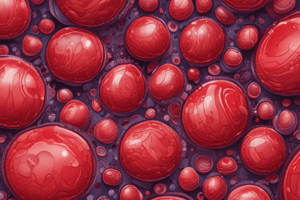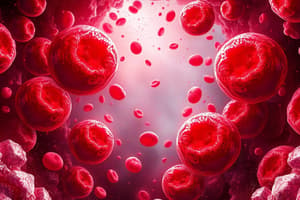Podcast
Questions and Answers
What is the primary function of platelets in the bloodstream?
What is the primary function of platelets in the bloodstream?
- Aiding in blood clotting (correct)
- Transporting oxygen throughout the body
- Producing red blood cells
- Regulating body temperature
Which component of blood is responsible for carrying carbon dioxide from body tissues to the lungs for elimination?
Which component of blood is responsible for carrying carbon dioxide from body tissues to the lungs for elimination?
- Plasma
- Platelets
- Red blood cells (correct)
- White blood cells
What role do white blood cells play in the human body?
What role do white blood cells play in the human body?
- Carrying oxygen to organs
- Transporting nutrients from the digestive tract
- Defending against infections (correct)
- Aiding in clotting to prevent bleeding
Which blood component is primarily responsible for hormone transportation in the body?
Which blood component is primarily responsible for hormone transportation in the body?
What percentage of the total blood volume in the average human adult consists of white blood cells and platelets combined?
What percentage of the total blood volume in the average human adult consists of white blood cells and platelets combined?
In maintaining homeostasis, what critical role does blood play in regulating body temperature?
In maintaining homeostasis, what critical role does blood play in regulating body temperature?
What is the primary function of red blood cells in the body?
What is the primary function of red blood cells in the body?
Which component of blood acts as a carrier for various molecules like proteins and hormones?
Which component of blood acts as a carrier for various molecules like proteins and hormones?
How long does a typical red blood cell live before being replaced?
How long does a typical red blood cell live before being replaced?
What is the function of white blood cells in the body?
What is the function of white blood cells in the body?
Which type of blood cell has the unique ability to bind to oxygen molecules in the lungs?
Which type of blood cell has the unique ability to bind to oxygen molecules in the lungs?
Apart from oxygen, what other molecule do red blood cells transport in the body?
Apart from oxygen, what other molecule do red blood cells transport in the body?
Flashcards are hidden until you start studying
Study Notes
Blood: The Liquid That Pumps Life Into Our Bodies
Introduction
Blood is an essential component of our existence. It plays a crucial role in providing vitality to our bodies and sustaining various physiological processes. Let's explore the intricacies of blood, including its composition, components, and functions.
What Is Blood?
Blood is a complex mixture of cells, liquids, and gases that serves as the primary means of transporting life-sustaining substances throughout the body. It consists of primarily three types of cells - red blood cells (RBCs), white blood cells (WBCs), and platelets, along with a fluid component known as plasma. Plasma acts as a carrier for various molecules, such as proteins, hormones, glucose, and lipids.
Red Blood Cells (RBCs)
Red blood cells, or erythrocytes, are flat, biconcave discs that contain a protein called hemoglobin. Hemoglobin has the remarkable ability to bind to oxygen molecules in the lungs and release them when needed in tissues. The high surface area of these cells allows efficient gas exchange between blood and surrounding tissues. Each red blood cell lives for approximately four months before being replaced by new ones produced in the bone marrow.
White Blood Cells (WBCs)
White blood cells, or leukocytes, are part of the immune system. They defend the body against infection and foreign invaders. There are different types of white blood cells, including neutrophils, lymphocytes, monocytes, and eosinophils, each playing a specific role in immunity.
Platelets
Platelets, also known as thrombocytes, are small fragments of cells responsible for clotting. When a blood vessel is damaged, platelets aggregate at the site and help form a temporary plug to prevent excessive bleeding. They also work with proteins called clotting factors to control internal bleeding and maintain hemostasis.
Functions of Blood
Blood plays several vital roles in maintaining homeostasis within the human body:
- Transport of Oxygen: Red blood cells carry oxygen from the lungs to various organs, enabling respiration.
- Delivery of Nutrients: Blood transports essential nutrients from the digestive tract to all parts of the body.
- Removal of Carbon Dioxide: Through veins, blood carries carbon dioxide from body tissues to the lungs for elimination.
- Regulation of Body Temperature: Blood helps maintain body temperature by distributing heat throughout the body.
- Immunity and Defense: White blood cells fight against infections caused by bacteria, viruses, and other pathogens.
- Hormone Transportation: Plasma carries hormones produced by endocrine glands to target tissues.
- Waste Removal: Blood transports waste products such as urea and lactic acid to organs responsible for their removal.
Blood Volume and Composition
The average human adult has about 5 liters (6 quarts) of blood in their body, which is approximately 10% of their total body weight. The composition of blood varies, but typically contains around 45% red blood cells, 45% plasma, and less than 1% white blood cells and platelets.
Conclusion
In conclusion, blood is a vital fluid that sustains life through its role in transporting oxygen, nutrients, and immune system components while removing waste products. Its complex composition allows for efficient delivery and disposal of essential substances within the body. Understanding the intricacies of blood can provide valuable insights into various physiological processes and potential areas for therapeutic intervention.
Studying That Suits You
Use AI to generate personalized quizzes and flashcards to suit your learning preferences.




